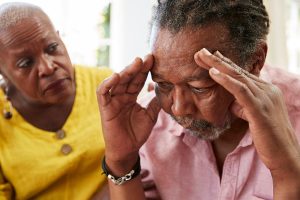Johnson & Johnson’s single-dose coronavirus vaccine is much less effective against the highly contagious Delta variant than it is against the original virus, new research claims.
“The message that we wanted to give was not that people shouldn’t get the J&J vaccine, but we hope that in the future, it will be boosted with either another dose of J&J or a boost with Pfizer or Moderna,” study author Nathaniel Landau, a virologist at NYU’s Grossman School of Medicine, told The New York Times.
The troubling news came the same day that Dr. Rochelle Walensky, director of the U.S. Centers for Disease Control and Prevention, told lawmakers that the Delta variant now accounts for 83% of new coronavirus cases in this country.
“This is a dramatic increase, up from 50% for the week of July 3,” Walensky said during a Senate committee hearing on Tuesday.
As worrying as the J&J vaccine findings are, they came from experiments on blood samples in a laboratory, and may not reflect the vaccine’s performance in the real world, theTimes reported. But mounting evidence is suggesting that the 13 million Americans who have gotten the J&J vaccine may need a second dose.
Experts noted that all of the vaccines seem to work better when given in two doses.
“I have always thought, and often said, that the J&J vaccine is a two-dose vaccine,” John Moore, a virologist at Weill Cornell Medicine in New York City, told the Times.
Moore added that several studies in monkeys and people have shown greater efficacy with two doses of the J&J vaccine. He noted the new study was particularly credible because it was published by a team with no ties to any of the vaccine makers.
The latest conclusions do run counter to those from smaller studies published by the company in early July that suggested a single dose of the vaccine works against the variant up to eight months after the shot is administered, the Times reported.
The new study was published online on the preprint server BioRxiv and has not yet been peer-reviewed or published in a medical journal. But it jibes with observations that a single dose of the AstraZeneca vaccine — which is similar to J&J’s shot — shows only about 33 percent efficacy against symptomatic disease caused by the Delta variant.
In the study, Landau and his colleagues looked at blood samples taken from 17 people who had been immunized with two doses of an mRNA vaccine and 10 people with one dose of the J&J vaccine.
The J&J vaccine started out with a lower efficacy than the mRNA vaccines (Pfizer and Moderna) and showed a bigger drop in efficacy against the Delta variant. “The lower baseline means that what’s left to counter Delta is very weak,” Moore said. “That is a substantial concern.”
While using the J&J shot in a second dose may be enough to counter the variant, there’s evidence that using an mRNA vaccine for the second shot, rather than another J&J shot, may work even better. According to the Times, a number of studies have shown that combining one dose of the AstraZeneca vaccine with a dose of the Pfizer-BioNTech or Moderna vaccines raises the immune response more effectively than two doses of AstraZeneca.
Even as some vaccines falter against the Delta variant, U.S. vaccination rates have stalled. Less than half of the country’s population is fully vaccinated, according to CDC data, and the majority of those who are not vaccinated are not likely to get vaccinated, according to a poll published Tuesday by Axios-Ipsos.
If many of those who are holding out do not get a vaccine, Dr. Anthony Fauci said, the country can expect a “smoldering” outbreak for “a considerable period of time.”
U.S. issues toughest travel alert for Britain as cases surge there
The U.S. government issued its most dire warnings against travel to Britain this week as coronavirus cases surged in that country while nearly all COVID-19 restrictions were lifted in an effort to restart the economy.
Both the U.S. State Department and the U.S. Centers for Disease Control and Prevention announced Level 4 travel alerts and urged all Americans to avoid visiting the U.K.
“Even fully vaccinated travelers may be at risk for getting and spreading COVID-19 variants,” the CDC said in its updated notice.
In its advisory, the State Department delivered an even stronger warning: “Do not travel to the United Kingdom due to COVID-19,” the advisory said.
The new warnings are not binding, but they were issued as Britain struggles with a surge in new infections fueled by the Delta variant that brought India to its knees this past spring.
Still, the British government forged ahead with plans to abandon most social distancing measures in England on so-called “Freedom Day” on Monday.
But after videos circulated widely of thousands of revelers jammed into bars and night clubs on Monday night, the British government said it would issue new rules to require people to provide proof of vaccination to enter nightclubs and other crowded venues, the Washington Post reported.
Those restrictions will not take effect until the end of September, Prime Minister Boris Johnson said at a news conference, after residents over the age of 18 are offered the chance to be vaccinated.
“I don’t want to have to close nightclubs again,” Johnson said, the BBC reported. “But it does mean nightclubs need to do the socially responsible thing.”
Britain is now reporting a seven-day average of roughly 45,000 daily new cases, according to Our World in Data. Some of the country’s top leadership — including Johnson — are in quarantine after Health Secretary Sajid Javid tested positive for the virus over the weekend, the Post reported.
More than half of Britain’s population has received two doses of coronavirus vaccine, a level of immunization that officials say has helped curb hospitalizations and deaths.
Still, hospitalizations have risen nearly 40 percent over the past week, although Patrick Vallance, Britain’s chief scientific adviser, said 60 percent of new COVID-19 patients are unvaccinated.
More information
The U.S. Centers for Disease Control and Prevention has more on COVID-19.
SOURCES: The New York Times; CNN; Washington Post
Source: HealthDay
Copyright © 2025 HealthDay. All rights reserved.

















